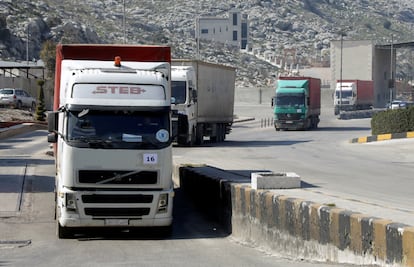The World Food Program will end its main assistance program in Syria in January, affecting millions
WFP in its latest statement said the cuts come as food insecurity is ‘worse than ever before’. Over 12 million people lack regular access to sufficient food

The U.N. World Food Program said Monday it will end in January its main assistance program across war-torn Syria, where over 12 million people lack regular access to sufficient food.
WFP in recent years has scaled down its support in Syria and neighboring countries that host millions of Syrians who fled the conflict, now in its 13th year. Humanitarian agencies have struggled to draw the world’s attention back to Syria as they face donor fatigue and shrinking budgets.
In July, WFP said it had to cut assistance to almost half of the 5.5 million Syrians it supported in the country due to budget constraints.
A month later, the agency slashed cash aid to Syrian refugees in Jordan. In November, it and the U.N. refugee agency said they will reduce the number of Syrian refugees in Lebanon receiving cash assistance by a third next year.
WFP in its latest statement said the cuts come as food insecurity is “worse than ever before” and that millions will be affected.
The agency’s most recent report in September said 3.2 million Syrians benefitted from its programs.
WFP said it will keep smaller aid programs, a school meals program and initiatives to rehabilitate Syria’s irrigation systems and bakeries.
Like other major humanitarian agencies, WFP after the start of Syria’s uprising-turned-civil war in 2011 scaled up support for Syrians in the country and for those who fled to Lebanon, Turkey, Jordan and Iraq.
They have blamed their shrinking budgets for Syria on global donor fatigue, the Covid-19 pandemic and the war in Ukraine. Meanwhile, needs have surged in the besieged Gaza Strip during the Hamas-Israel war.
Though much of the fighting in Syria has subsided, the economic outlook is grim, whether in government-held territory, the northwestern enclave under al-Qaida-linked militants and Turkish-backed rebels, or the northeast under U.S.-backed Kurdish-led forces.
The UN estimates that 90% across Syria live in poverty. The value of the national currency has spiraled, while an illegal drug trade flourishes and unemployed Syrians try to leave for opportunities elsewhere.
Sign up for our weekly newsletter to get more English-language news coverage from EL PAÍS USA Edition
Tu suscripción se está usando en otro dispositivo
¿Quieres añadir otro usuario a tu suscripción?
Si continúas leyendo en este dispositivo, no se podrá leer en el otro.
FlechaTu suscripción se está usando en otro dispositivo y solo puedes acceder a EL PAÍS desde un dispositivo a la vez.
Si quieres compartir tu cuenta, cambia tu suscripción a la modalidad Premium, así podrás añadir otro usuario. Cada uno accederá con su propia cuenta de email, lo que os permitirá personalizar vuestra experiencia en EL PAÍS.
¿Tienes una suscripción de empresa? Accede aquí para contratar más cuentas.
En el caso de no saber quién está usando tu cuenta, te recomendamos cambiar tu contraseña aquí.
Si decides continuar compartiendo tu cuenta, este mensaje se mostrará en tu dispositivo y en el de la otra persona que está usando tu cuenta de forma indefinida, afectando a tu experiencia de lectura. Puedes consultar aquí los términos y condiciones de la suscripción digital.








































